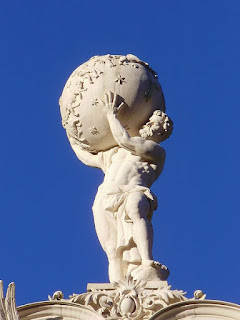I love pinball machines. I love the colorful illustrations on the playing field and the cabinets, like playing a comic book. I love the flashing lights and all the random noises and sound effects. I love the games themselves. If I were a rich man, I would collect pinball machines. I would have them fully restored to their bright, original shine, and I would display them all along one wall of my huge game room. If a case could be made that a game can possibly be a work of art, I think pinball might have the best chance of qualifying for that title.
Despite the impressive imagination and creativity that goes into the art-work used to decorate pinball machines, one could still argue that pinball machines lack a fundamental aspect required for something to qualify as true art: depth and significance of meaning. Cartoon rocket ships, sharpshooting electric cowboys flashing hands of poker, and alluring women draped over the shoulders of a secret agent are neither meaningful or profound. I'll grant you that. But this is based in the assumption that the artistry is something to stand back and contemplate. Quite the contrary. Pinball may be the world's first interactive art-form. The art is found in the playing of the game itself.
While it has been argued elsewhere that the interactivity of modern video games may be counter-productive to their ability to present a piece of narrative art, the very interactivity of pinball allows it to convey an artistic representation that is impossible in other art forms. Simply put, pinball portrays an artistic representation of the learning process. It represents, not the mind, but rather the mind's relationship with the world. On a small scale, it reproduces the lifelong process of how we grapple with reality.

At your first encounter with a new pinball machine, you are confronted with a chaos of brightly disordered stimuli. No matter how many pinball games you might have played in the past, you understand nothing of the rules and complicated scoring systems of this particular machine, because every machine is different. This apparent chaos is an almost universal feature of pinball design, and it goes hand in hand with its colorful and noisy assault on the senses. There is something so wonderfully, and yet indefinably, appealing about it. This is because it affords us the rare opportunity, in microcosm, to experience the world almost as we did as an infant: bright, immediate sensory input without analysis or categorization. The machine stands before us as the world once did, simply as a feast for the eyes and the ears.
Now, it's true when we are presented with any kind of new game, say backgammon or Monopoly, with rules that we are unfamiliar with, we have nothing but our immediate sensory impression to go by. We see the colorful pieces, the board, so on. But from a lifetime of arranging sensory information into units and systems, we immediately recognize the sense of order in the games. We may not know the rules, but we have the undeniable intuition that there are rules. From long experience, we know organization when we see it. Pinball deliberately bypasses this intuition by obscuring any appearance that there is any underlying system beneath all the sound and fury. The first glance at a pinball table looks like nothing but a mess...a shiny, fascinating mess.
As we begin to play, the only thing we know for certain is that we need to keep the ball in play for as long as we can. Basic survival. But the longer we're able to keep the ball going, the more we gradually begin to pick up. We learn that hitting this particular series of targets activates a certain bonus over here. We learn that when the bumpers are a certain color their scores double or triple. We learn that hitting a ramp X amount of times triggers a new round that changes everything. We learn. We discover that there is an incredible complexity behind all this chaos, and as you learn, you move up into higher echelons of understanding where there are missions and objectives involving multiple, intricate combinations of the other rules you've discovered. Systems upon systems.

With most games, it's usually a good idea to learn the rules before you play. It's possible to figure things out on the fly, but you'll find yourself at a disadvantage. But with pinball, no one knows the rules when they start to play, beyond the basic rule of survival. Learning the rules and using them to your advantage is an essential element of the game itself. The learning happens almost naturally, organically. You pick it all up almost effortlessly, at the pace of your own skill and intelligence. Not only is pinball an art form because it is a representation of the learning process, but also because, like all really true art forms, it provides the exhilarating, cathartic, thoroughly enjoyable, experience of it.
Now, I couldn't end this post without at least an honorable mention of Tommy, the eponymous Pinball Wizard from the song of the same name. It was no random accident that pinball was Tommy's game of choice. If you're familiar with the album, you'll recall that Tommy's blindness, deafness, and dumbness were a hysterical response to witnessing his father's murder. It was all in his head. The doctor confirmed this with his instruments. Yet, the fact of his unawareness, his inability to grasp and understand the world, is emphasized again and again. Pinball serves Tommy as a substitute for the world he has refused to relate to and learn about, just as it is often said art becomes a substitute for the artist's ability to deal with reality.
So, until the day someone shows up at my door with a bag of money in each hand, I'll go on dreaming of my own private gallery, filled not with Picasso and Van Gogh, but with Williams, Bally, and Gottlieb.
























